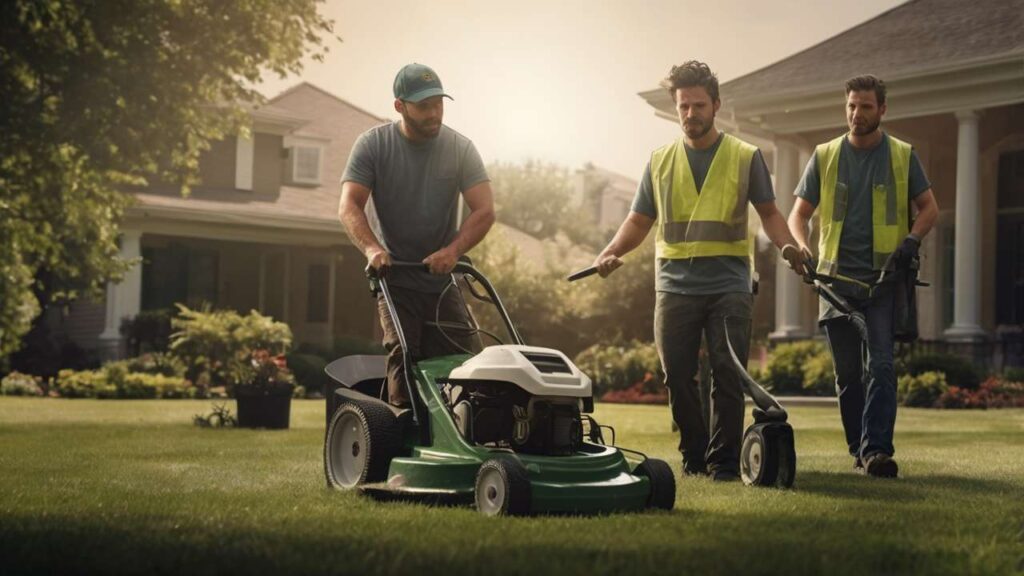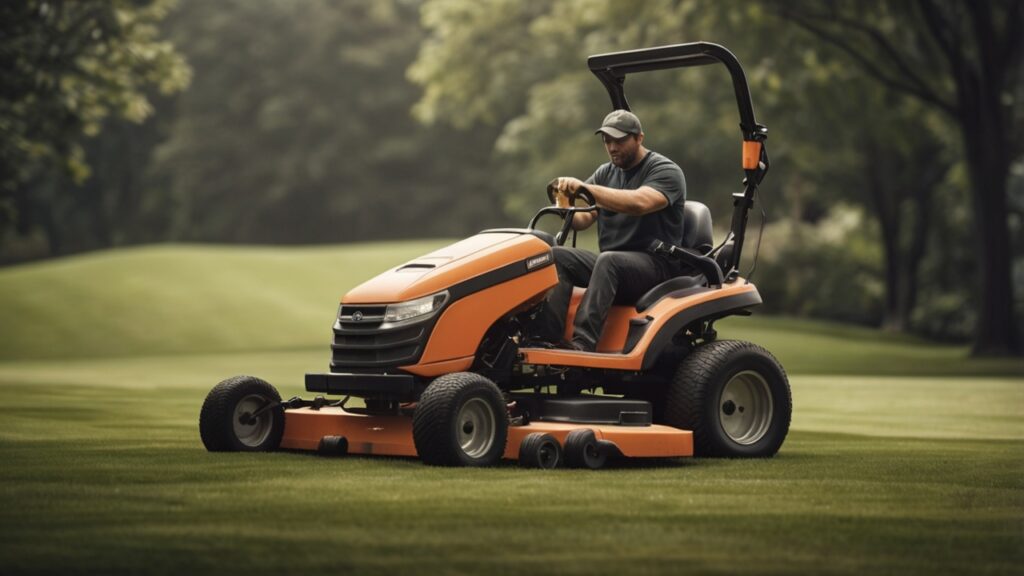There’s something strange yet powerful about the way a yard shapes a home’s identity. A healthy lawn is not only grass that’s green; it’s peace of mind, a silent but strong asset that improves property value by up to 15%. Many homeowners don’t even realize that the financial and emotional return on investment from lawn care is higher than repainting walls or replacing cabinets. Buyers are first greeted by the yard before they ever see a kitchen. That single impression—sharp edges, lush grass, a tidy design—creates instant trust in the property. Neglected patches, on the other hand, reduce perceived value, sometimes by thousands of dollars.
In real estate markets where competition is intense, curb appeal ROI is the secret weapon. A house with well-kept landscaping and outdoor living space design sells faster and often sparks multiple offers. I’ve seen homes that sat for months finally sell after nothing more than reseeding the lawn and trimming shrubs. A trusted realtor in Raleigh once shared, “Curb appeal is the handshake of your home—it sets the tone for everything else.” That statement stuck with me. A healthy lawn doesn’t just mean better grass; it’s about presenting reliability, attention to detail, and even a sense of emotional stability to potential buyers.
- Financial Value That Can’t Be Ignored
- Emotional Benefits of a Beautiful Lawn
- Why Soil Testing and Aeration Matter
- Weed and Pest Control: Hidden Invaders
- Beyond Mowing: Why a Schedule Works
- Professional vs. DIY: The Honest Truth
- Case Study: Peace of Mind in Practice
- Expanding Outdoor Living and Lifestyle
- Looking Ahead: New Angles to Explore
- FAQs
Financial Value That Can’t Be Ignored
The return is not imaginary. Studies have shown buyers are willing to pay 10–15% more for a home with strong landscaping. A healthy lawn is like an invisible negotiator during property showings. The psychology is simple: people pay for beauty and convenience. Low maintenance yard design makes this even stronger because today’s buyers want visual appeal without endless work. Installing automated irrigation or choosing native, drought-resistant grasses gives the impression of efficiency, and efficiency translates to value.
What’s fascinating is that sellers sometimes skip this step because they assume interior upgrades matter more. Yet bathrooms or kitchens rarely give the same ROI as landscaping. Real estate landscaping value is measurable in both dollars and speed. A house with good landscaping simply moves faster. That means less stress, fewer months paying mortgages on an empty house, and an easier life transition.
Emotional Benefits of a Beautiful Lawn
The financial upside is obvious, but let’s not ignore the hidden gem: the emotional ROI. Walking barefoot on a thick, soft lawn after a long day isn’t just comfort—it’s therapy. Parents can watch their kids roll around without fear of weeds or pests. Backyard barbecues become more enjoyable when guests compliment the view. The sense of peace that comes with a reliable, thriving yard is hard to measure, but anyone who’s lived with one knows it’s real.
One of my neighbors, after struggling with patchy soil, finally invested in professional aeration and fertilization. The change wasn’t just visual. He told me, “I feel calmer at home now. The lawn feels like an escape, like my own park.” That’s what quality of life improvements are all about—turning daily living into something lighter.
Why Soil Testing and Aeration Matter
Decoding your dirt is the first step in making all of this happen. Soil testing isn’t a gimmick; it’s the foundation. If the soil is compacted, water and nutrients never reach the roots. Aeration opens the earth, letting it breathe again. Many experts say homeowners waste more money trying to fix a lawn with random fertilizers than they would by just testing their soil first. Tools like manual aerators or plug machines may look intimidating, but they’re cheaper than constant reseeding failures. And honestly, the feeling of pulling up a plug of dirt and realizing your lawn can breathe again—it’s oddly satisfying.
Weed and Pest Control: Hidden Invaders
A healthy lawn doesn’t stay beautiful on its own. Weeds and pests creep in silently, and before you realize it, the whole yard looks exhausted. The ultimate guide to weed and pest control is about identifying the enemy early. Crabgrass, dandelions, chinch bugs—they all have patterns. Once spotted, the solution is a mix of strategy and consistency. Spraying randomly often does more harm than good. Professionals use pre-emergent herbicides, targeted treatments, and even biological methods like nematodes for grubs. I once tried a DIY solution with vinegar for weeds—it worked for a week, but the problem came back twice as strong. That’s where professional and trusted services prove their worth.
Beyond Mowing: Why a Schedule Works
Most people mow the lawn and call it done. But beyond mowing, the key is a professional lawn care schedule. Think of it like a medical routine for your yard: fertilizing in spring, pest checks in summer, overseeding in fall, and protective treatments before winter. Consistency matters more than intensity. Skipping one step often undoes the progress of the last. And honestly, unless you’re passionate about weekend yard work, it gets overwhelming. Professional lawn care companies in North Carolina and across the country have programs that keep yards thriving year-round. They bring reliable equipment, expert knowledge, and the results show.
Professional vs. DIY: The Honest Truth
There’s always the big question: is it worth paying for experts, or should you try it yourself? The complete cost-benefit analysis of professional lawn care vs. DIY shows the trade-offs in time, money, and results. On paper, DIY is cheaper, but hidden costs—buying tools, wrong fertilizer choices, wasted weekends—add up fast. Professionals already have the best tools, tested methods, and trained eyes. It’s like fixing a car: you can change oil at home, but rebuilding a transmission? Probably best left to the pros. For a deeper breakdown, check this detailed comparison of professional lawn care vs. DIY.
Case Study: Peace of Mind in Practice
There was a couple in Charlotte who nearly gave up on selling their home. The house sat on the market for 90 days with barely a nibble. Their agent suggested a lawn transformation—basic soil testing, aeration, reseeding, and a structured maintenance schedule. Within four weeks, the yard turned lush. Photos of the new lawn went online, and suddenly buyers lined up. They sold above asking price, and the husband later admitted, “The grass sold the house, not the kitchen.” This case study isn’t unusual; it’s happening everywhere.
Expanding Outdoor Living and Lifestyle
Beyond resale, think about your own lifestyle. A professional lawn care program isn’t just about selling—it’s about living. Designing outdoor living spaces with patios, fire pits, or even simple garden furniture becomes more enjoyable when the base (the lawn) is reliable. Families create memories outside, children play without worry, and even pets benefit from a clean, pest-free yard. It’s part investment, part lifestyle choice.
For those curious about professional options, you can explore trusted lawn care companies in North Carolina, or browse more insights in the lawn care services category. There’s also a ton of practical advice on Pro Service Tips for anyone who wants to dive deeper into the details.
Looking Ahead: New Angles to Explore
Lawn care isn’t just mowing and watering. It’s an expanding field that touches sustainable living, smart technology, and even mental health. Topics like rainwater harvesting for irrigation, eco-friendly turf alternatives, robotic lawn mowers, or even the psychology of green spaces open doors for future exploration. The industry isn’t standing still; it’s evolving toward efficiency and sustainability. Some homeowners already experiment with pollinator-friendly yard designs or drought-tolerant landscapes. All of this ties back to the same truth: curb appeal has both financial and emotional power.
FAQs
Q1: How does lawn care increase property value?
Lawn care boosts curb appeal, which directly affects buyer perception. Studies show buyers are willing to pay up to 15% more for a home with a healthy, attractive lawn.
Q2: Is professional lawn care worth it compared to DIY?
Yes, in many cases. While DIY saves money upfront, professional lawn care delivers reliable, long-term results, avoids costly mistakes, and often pays for itself in higher home resale value.
Q3: Can landscaping really speed up a home sale?
Absolutely. Homes with good landscaping and a healthy lawn typically sell faster. The first impression creates confidence in buyers, making them more willing to commit quickly.
A lawn is not just grass—it’s value, peace of mind, and lifestyle combined. So whether you’re preparing to sell or simply want to live better, think of your yard as a long-term investment. Share this article with friends and neighbors using the social buttons below, because who doesn’t want both financial and emotional ROI from something as simple—and powerful—as a healthy lawn?


